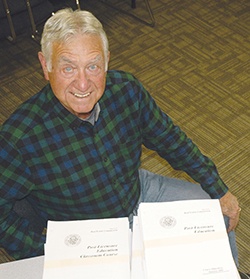New Agents and Old Alike Flood Real Estate Schools
by October 28, 2013 12:00 am 117 views

Real estate instructors are busy again.
The recent upswing in the Northwest Arkansas market has inspired a new crop of agents and has also motivated those who were inactive to rejoin the game.
They’re taking the 60-hour pre-licensing course as well as the courses they need to maintain their standing — post-licensing and continuing education.
“It’s just starting to hit this year,” said instructor Chad Kumpe, head of the Success Real Estate School in Rogers, referring to the difference between this year and 2012.
“My pre-licensing classes are larger, so a lot of people are trying this out,” he said.
The Arkansas Real Estate Commission does not track the number of licenses issued per region, but on a state level, the numbers tell the story.
In October of 2007, there were 12,014 active licenses. In the wake of the Great Recession, when home prices tanked and subdivisions went bust, the number of licenses dwindled to a low of 8,342 by Jan. 1 of this year.
But by Oct. 1, the number of active licenses had surged to 8,848, for an increase of 6 percent.
New agents represent a diverse portrait of society, Kumpe said, and also reflect the reality of the post-recession economy.
“A lot of people are older and have lost their jobs and can’t find work anywhere else,” he said. About 73 percent of agents are 45 years of age and older.
The commission requires a 60-hour pre-licensing course and successful completion of an exam before a license can be issued. Within a year of receiving a license, an agent must take 18 hours of post-licensing, and each year, at least six hours of continuing education. While plenty of students opt to attend class, all real estate courses can be taken online with the exception of post-licensing, which must be taken in person. For those who have had a license for two years and who want to become a broker, an additional 12 hours is required.
It’s a lot of red tape, but necessary.
“This is how you stay out of trouble,” Kumpe said.
In terms of post-licensing, the selected topics are agency disclosure, contracts and forms, and contracts to close.
Through the course of post-licensing, an agent is exposed to buyer agency agreements, listing agreements, the difference between commercial, residential, raw land and auctions. They are also introduced to the raft of addendums that can accompany any real estate transaction.
Agents are also taught to do what they are supposed to do: sell real estate. Accounting, legal advice, appraisals, inspections and surveys should be left to others.
For Kumpe, the need for instructors is obvious.
“Brokers can’t find the time to properly educate their agents,” he said.
Agents who do not complete post-licensing and continuing education can have their licenses inactivated, and in some cases, can be fined.
Continuing ed was established in 1987 and post-licensing in 2002. Before that, real estate in Arkansas had a very different feel.
“It was much more Wild West when I started,” Kumpe said. “A broker would just go up to you and say, ‘Go list something.’ Buyers and sellers are being treated much better than they used to be.”
In an ideal world, agents would take post-licensing as soon as possible after receiving their license. That rarely happens, and many agents spend their first year in real estate fumbling around an office looking for the right form, said Donna Bittle, an executive broker and instructor at Academy Real Estate School in Fayetteville.
“I think it would help their career,” she said, referring to a quick turnaround on post-licensing. “But most of them won’t because they’re in a hurry [to start selling property].”
In Missouri, where Bittle also holds a license, an agent can’t participate in a real estate deal until post-licensing is taken. While she said she’s not expecting that to happen in Arkansas, she does see an increase in continuing ed and tighter regulations for brokers at some point in the near future.
Like Kumpe, Bittle has experienced the recent uptick in new agents.
“Here we go again,” she said. “My class sizes have doubled. And we’re just now seeing the beginning of it.”
A lot of agents put their licenses on inactive status during the downturn, meaning they can pull them out and dust them off by catching up with continuing ed. Plenty of them are doing just that.
It’s no secret that people are optimistic. Residential prices are rising, subdivisions once overrun with weeds are now sprouting homes, and at least in Northwest Arkansas, unemployment is low and consumer sentiment is high.
In this environment, some new agents will go on to become multi-million-dollar producers, the goal of all agents. Others, however, won’t find a home in real estate.
